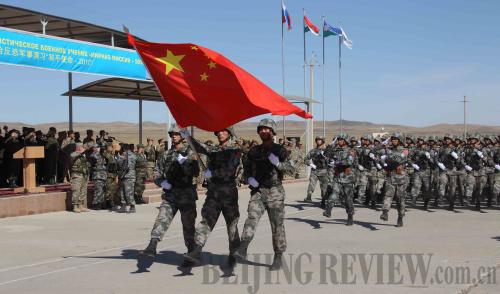|
 |
|
FOR PEACE: Chinese soldiers parade in the Matybulak range near the largest Kazakh city of Almaty on September 24, 2010, during a Shanghai Cooperation Organization antiterror drill (WANG JIANMIN) |
The West might have neglected the fundamental issue. China has valued the transparency of its nuclear weapon policy rather than the transparency of the quantity and deployment of its nuclear weapons. Immediately after it succeeded in testing its first atomic bomb in 1964, China declared that under no circumstances will it be the first to use nuclear weapons. In light of this pledge, questions about the number of China's nuclear bombs and their deployment are of little importance.
Nuclear weapons, which are not only a military deterrent, but also a political weapon, require huge investment. The disintegration of the Soviet Union was somewhat connected with the nuclear arms race between the United States and the Soviet Union. At present, China is concentrating on economic development and will therefore not devote significant financial resources to enlarging its nuclear arsenal.
The controversy over military transparency is an inevitable outcome of international political wrangling. The military transparency of powerful countries and weak countries should not be assessed with uniform standards. For militarily strong countries, making their military capabilities transparent produces an effect of strategic deterrence. Weaker countries, however, will become even more vulnerable if their limited military resources are exposed. Therefore, powerful countries' military transparency demands are likely to spark caution in weaker countries.
Historically and culturally, China is a modest and unassertive nation. From the "golden mean" of the Confucian school to the Taoist concept of "letting things take their own course," traditional Chinese philosophy asks people to avoid extremes. Lao Zi, a philosopher in the Spring and Autumn Period (770-221 B.C.) and founder of Taoism, called for humility in leadership and a restrained approach. Sun Tzu, a strategist in the same period who authored The Art of War, said all warfare is based on deception. All those philosophic ideas have exerted a great influence over the thinking and values of Chinese people.
In their 1997 book, The Great Wall and the Empty Fortress: China's Search for Security, U.S. political scientists Andrew Nathan and Robert S. Ross quoted a story from Romance of the Three Kingdoms, a classic Chinese novel, in which Zhuge Liang, Prime Minister of Shu Kingdom (221-263), defeated a formidable enemy with an "empty fortress strategy." The strategy uses reverse psychology to deceive the enemy into thinking that an empty fortress is full of traps and ambushes.
The story provides a good example of how Chinese military strategists manage transparency and opacity. It shows militarily weak countries can achieve their strategic goals by being opaque. The tactic is crucial for weak countries to protect themselves from the aggression of powerful ones.
The traditional belief in "keeping a low profile" also has played a role in shaping China's attitude on military transparency. The thought stems from Old Book of Tang, a history of the Tang Dynasty (618-907). It means behaving in a way that does not attract attention. In the 1980s, former Chinese leader Deng Xiaoping underlined the importance of this idea for China's future development. In the past 30 years, the idea has deeply influenced China's domestic and foreign policies. It partly explains why China is reserved about its military development.
Given the deep-seated influence of these traditional concepts, it is impossible and unrealistic for China to completely accept the military transparency standards that the West advocates.
The author is a research fellow with the China Institute of International Studies
Email us at: yanwei@bjreview.com | 